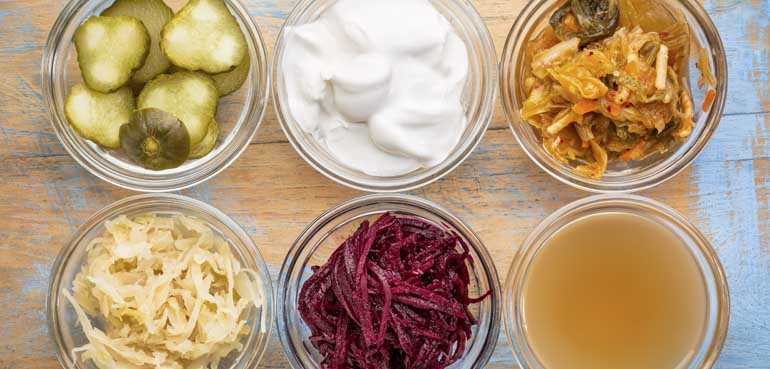By Amy Magill, MA, RD, LDN
Our bodies are teeming with bacteria. Lucky for us, many of these bacteria help our bodies work well. “Good” bacteria in our digestive systems help us digest foods, aid in producing certain vitamins, and fight “bad,” disease-causing bacteria. These live microorganisms are known as probiotics.
Foods and dietary supplements that contain probiotics are the same or similar to the good bacteria that are naturally found in our digestive systems. They can work to balance or replenish gut flora. This may provide us with health benefits.
Probiotics 101
Taking in probiotics through diet is a hot topic in research. It was once thought that these live cultures only helped digestive health. Now, experts say they may enhance the immune system and help with other conditions.
Some studies show that certain probiotics may help prevent diarrhea caused by infections or antibiotic use. Other research shows that live cultures may improve symptoms of pouchitis and irritable bowel syndrome. Researchers are also studying whether probiotics can help allergic conditions, high cholesterol, yeast and urinary tract infections, and more.
Keep in mind that this research is preliminary. It isn’t known how much of a probiotic you’d need to possibly improve your health. Plus, there are several strains of probiotics. Some may be more effective than others for certain conditions.
Foods with probiotics
Your doctor may recommend probiotics if he or she thinks you could benefit from them. Probiotics are found in fermented foods. The fermentation process of vegetables and dairy products allows nutrients in these foods to be more easily absorbed. Foods that naturally contain probiotics include:
Yogurt
Yogurt is the most widely available probiotic food in the U.S. It’s often advertised as containing live and active cultures. Yogurt is made by fermenting milk with probiotics. Cultured, non-dairy yogurts may also contain probiotics.
Kefir
Kefir is a tangy beverage that contains several strains of bacteria. Most types are fermented dairy products. The drink can also be made from coconut milk, coconut water, or sweetened water.
Sauerkraut and Kimchi
These fermented vegetables pack a probiotic punch. Sauerkraut is fermented cabbage, while kimchi is often a blend of fermented veggies.
Soy
Fermented soy is found in many Asian food staples. These include tempeh and miso soup.
Kombucha
Kombucha is a fizzy tea that’s fermented with yeast, bacteria, and often sugar. It’s sold in stores, and some people brew their own at home. However, home brews come with health risks if you let them sit too long. This is due to bacteria and mold growth. The Centers for Disease Control and Prevention recommends limiting kombucha intake to 4 ounces per day.
Probiotics may also be found in certain aged cheeses. Manufacturers may also add probiotics to foods that don’t naturally contain them, such as milk. Probiotics are also available in supplement form.
Amy Magill, MA, RD, LDN is Manager of Clinical Programs at Walgreens, where you can find a variety of vitamins to supplement your diet and improve digestion. She enjoys writing about how eating habits can affect overall health and the importance of choosing nutrient-rich foods. Although it is intended to be accurate, neither Walgreen Co., its subsidiaries or affiliates, nor any other party assumes for loss or damage due to reliance on this material. Walgreens does not recommend or endorse any specific tests, physicians, products, procedures, opinions, or other information that may be mentioned in the article. Reliance on any information provided by this article is solely at your own risk.
Sources:
Probiotics for gastrointestinal diseases. UpToDate.
https://www.uptodate.com/contents/probiotics-for-gastrointestinal-diseases
Probiotics: in depth. National Center for Complementary and Alternative Medicine. https://nccih.nih.gov/health/probiotics/introduction.htm#moreinfo
Prebiotics and probiotics: creating a healthier you. Academy of Nutrition and Dietetics.
http://www.eatright.org/resource/food/vitamins-and-supplements/nutrient-rich-foods/prebiotics-and-probiotics-the-dynamic-duo
Getz, L. Fermented foods – are they the next big nutrition trend? Today’s Dietitian. 2012;14(7): 32.
http://www.todaysdietitian.com/newarchives/070112p32.shtml
Schaeffer, J. Friendly bug invasion. Today’s Dietitian. 2013;15(9): 38. http://www.todaysdietitian.com/newarchives/090313p38.shtml
Orenstein, BWS. For your information: The wonders of kombucha tea – is it healthful or hazardous? Today’s Dietitian. 2015;17(6): 20. http://www.todaysdietitian.com/newarchives/060415p20.shtml

